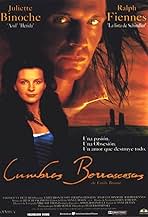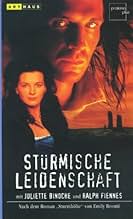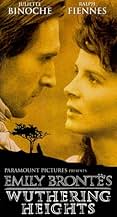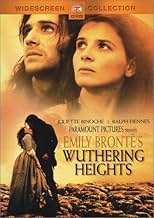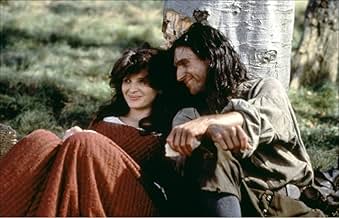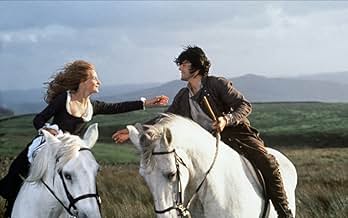AVALIAÇÃO DA IMDb
6,6/10
15 mil
SUA AVALIAÇÃO
Um homem fica obcecado com a vingança quando sua alma gêmea se casa com outro homem.Um homem fica obcecado com a vingança quando sua alma gêmea se casa com outro homem.Um homem fica obcecado com a vingança quando sua alma gêmea se casa com outro homem.
- Direção
- Roteiristas
- Artistas
- Prêmios
- 1 indicação no total
- Direção
- Roteiristas
- Elenco e equipe completos
- Produção, bilheteria e muito mais no IMDbPro
Avaliações em destaque
Wuthering Heights (1992) was directed Peter Kosminsky. It is an excellent film adaptation of the novel by Emily Brontë. Two things make this movie memorable. One is that director Kosminsky chose to give us the full novel, carrying it into the second generation. (Most movies end with Heathcliff and Kathy, but this version continue with the interaction of their children.)
The second memorable aspect of the movie is the wonderful acting of the two leads. Juliette Binoche plays Cathy Earnshaw and Ralph Fiennes portrays Heathcliff. (Binoche also portrays her daughter Catherine Linton.) Fiennes is a brilliant actor, and La Binoche is incomparable. There's an extraordinary onscreen chemistry between them.
I'll make special mention of Janet McTeer, who portrays Ellen Dean, the housemaid who knows everyone's secrets. She does everything a supporting actor should do to enhance the power of the movie.
Wuthering Heights would work better on the large screen, but we saw it on DVD, and it worked well enough. The film has an anemic IMDb rating of 6.9. I think that's because the novel is so dark and grim. The movie itself is much better than the rating would suggest. My recommendation is to see it and decide for yourself.
The second memorable aspect of the movie is the wonderful acting of the two leads. Juliette Binoche plays Cathy Earnshaw and Ralph Fiennes portrays Heathcliff. (Binoche also portrays her daughter Catherine Linton.) Fiennes is a brilliant actor, and La Binoche is incomparable. There's an extraordinary onscreen chemistry between them.
I'll make special mention of Janet McTeer, who portrays Ellen Dean, the housemaid who knows everyone's secrets. She does everything a supporting actor should do to enhance the power of the movie.
Wuthering Heights would work better on the large screen, but we saw it on DVD, and it worked well enough. The film has an anemic IMDb rating of 6.9. I think that's because the novel is so dark and grim. The movie itself is much better than the rating would suggest. My recommendation is to see it and decide for yourself.
As I am a writer, very seldom am I at a loss for words. Yet now, I can find none suitable. I have written many reviews, in many places, for quite a long time. Yet, never, in all of that time have I sat down to write my thoughts immediately after watching a film. Still, I sit here now, trying vainly to describe what I am feeling. What this movie has MADE me feel.
The story of Heathcliff and Cathy is not about love as most know it. It is MORE than love. It is a fusion, a union of two souls separated by society and circumstance, yet bonded so completely that even death could not sever them. Love beyond pain, beyond place, beyond reason.
Never has an adaptation brought this classic Victorian novel so completely to the screen. That, in itself, is high praise. Wuthering Heights had been made 14 times before this, the 1992 incarnation. It is the only version to tell the complete story in all of its dark detail. It is also the LAST time, to date, it has been made. And that should be the highest praise of all.
Why? Because there is no need to do it again. It cannot be improved upon beyond this. Yes, the movie can be a bit confusing, even abrupt in the plot shifts for those who have never read the book. But for those who have: Anne Devlin treats her screenplay with reverence for Emily Bronte's novel. Many whole scenes are intact, the dialog exactly as written originally. The scenery was breathtaking. And the house, the Heights itself, was perfect. Still standing there, after centuries, keeping its own secrets in the silence of its stones.
The cast of actors includes not one single Hollywood darling. Thank God. They would have ruined it. But, because the cast is not overly well known in the US, you concentrate on the PERFORMANCES rather than the performers.
And, it is in these performances this film rises above its predecessors. The actors all turn in solid efforts. Each is true to character, from selfish Cathy (Juliette Binoche) to vapid Isabella (Sophie Ward). Simon Shepherd's Edgar Linton is far more likable than the novel. His portrayal is an improvement on the original, and you actually pity him for being caught between Cathy and Heathcliff.
Heathcliff. An immortal character, like Sherlock Holmes, or Hamlet. Sir Laurence Olivier, arguably the best Hamlet, played Heathcliff in the 1939 version opposite Merle Oberon as Cathy. Until tonight, I thought his was the best Heathcliff, as well. Until tonight.
Tonight I watched Ralph Fiennes play Heathcliff. No, not play. He BECAME Heathcliff. Bronte's Heathcliff. A Heathcliff I had always pictured clearly in my mind, but had NEVER seen before my eyes. Before tonight. This man is RIVETING. He commands the story, seizing it, wrenching it to his will as Heathcliff does the lives of those around him.
Yet, you do not hate him for it. Rather, you ache for him. You look into his eyes and feel every rip in his soul, the agony of every jagged edge in his shattered heart. You watch him wear his cruelty like a mantle, lashing out at a world which denies him the only thing he has ever wanted, the only thing which will make him whole. I cry at movies all the time. Seldom, though, am I torn in a grief so absolute I am left at the end empty, and spent.
I don't know much about Ralph Fiennes work. I tend to like films that deal in anything BUT reality, so have not seen much of him. I loved Red Dragon, but until I read his filmography, I never connected Francis Dolarhyde to Heathcliff, which is perhaps the greatest compliment one can give an actor. Fiennes alone is the reason you cannot improve on this film. No one could ever bring Heathcliff to life like this. The role belongs to him.
I have loved Emily Bronte's novel since childhood. I have read it often. But now, something has changed it for me, forever. No matter how many times I may read Wuthering Heights in future, after tonight, I know I shall never again read it without seeing the face, or hearing the voice, of Ralph Fiennes.
The story of Heathcliff and Cathy is not about love as most know it. It is MORE than love. It is a fusion, a union of two souls separated by society and circumstance, yet bonded so completely that even death could not sever them. Love beyond pain, beyond place, beyond reason.
Never has an adaptation brought this classic Victorian novel so completely to the screen. That, in itself, is high praise. Wuthering Heights had been made 14 times before this, the 1992 incarnation. It is the only version to tell the complete story in all of its dark detail. It is also the LAST time, to date, it has been made. And that should be the highest praise of all.
Why? Because there is no need to do it again. It cannot be improved upon beyond this. Yes, the movie can be a bit confusing, even abrupt in the plot shifts for those who have never read the book. But for those who have: Anne Devlin treats her screenplay with reverence for Emily Bronte's novel. Many whole scenes are intact, the dialog exactly as written originally. The scenery was breathtaking. And the house, the Heights itself, was perfect. Still standing there, after centuries, keeping its own secrets in the silence of its stones.
The cast of actors includes not one single Hollywood darling. Thank God. They would have ruined it. But, because the cast is not overly well known in the US, you concentrate on the PERFORMANCES rather than the performers.
And, it is in these performances this film rises above its predecessors. The actors all turn in solid efforts. Each is true to character, from selfish Cathy (Juliette Binoche) to vapid Isabella (Sophie Ward). Simon Shepherd's Edgar Linton is far more likable than the novel. His portrayal is an improvement on the original, and you actually pity him for being caught between Cathy and Heathcliff.
Heathcliff. An immortal character, like Sherlock Holmes, or Hamlet. Sir Laurence Olivier, arguably the best Hamlet, played Heathcliff in the 1939 version opposite Merle Oberon as Cathy. Until tonight, I thought his was the best Heathcliff, as well. Until tonight.
Tonight I watched Ralph Fiennes play Heathcliff. No, not play. He BECAME Heathcliff. Bronte's Heathcliff. A Heathcliff I had always pictured clearly in my mind, but had NEVER seen before my eyes. Before tonight. This man is RIVETING. He commands the story, seizing it, wrenching it to his will as Heathcliff does the lives of those around him.
Yet, you do not hate him for it. Rather, you ache for him. You look into his eyes and feel every rip in his soul, the agony of every jagged edge in his shattered heart. You watch him wear his cruelty like a mantle, lashing out at a world which denies him the only thing he has ever wanted, the only thing which will make him whole. I cry at movies all the time. Seldom, though, am I torn in a grief so absolute I am left at the end empty, and spent.
I don't know much about Ralph Fiennes work. I tend to like films that deal in anything BUT reality, so have not seen much of him. I loved Red Dragon, but until I read his filmography, I never connected Francis Dolarhyde to Heathcliff, which is perhaps the greatest compliment one can give an actor. Fiennes alone is the reason you cannot improve on this film. No one could ever bring Heathcliff to life like this. The role belongs to him.
I have loved Emily Bronte's novel since childhood. I have read it often. But now, something has changed it for me, forever. No matter how many times I may read Wuthering Heights in future, after tonight, I know I shall never again read it without seeing the face, or hearing the voice, of Ralph Fiennes.
Although I would not suggest this film to anyone who has not read the book first (you would be thoroughly confused and missing out on major details of the plot!) I found Wuthering Heights (1992) to be the ideal visual aid to compliment the tragedy and passion of Heathcliff and Catherine's story. If Emily Bronte were alive, she herself would have cast Ralph Fiennes as Heathcliff (he was born for the role!) and Juliette Binoche was perfect particularly when she showed the more playful and childish sides of Catherine (her laughter was exactly as I had imagined - bright and bold...and just irritating enough that it really would drive Heathcliff - and later, Hareton - to suffer from wounded pride when it was directed at their egos). The beauty of this story is that you never really can decide who is the villain and who is the victim....
Famously, this portrays for the first time the whole of the story in the book, it is captivating and moves fast, and Fiennes deserves superlatives as the diabolical Heathcliff, menacing but with the eyes of a wounded animal.
There's something worthwhile here. That is the love story with love that was not consummated, not allowed to because they were from different worlds, because even though they connect in a deep way, the rules of the game say otherwise. Different times, but you can assume that it used to be so at Bronte's time, as it was later in Tolstoy's.
So they part, but they have grown roots so deep in each other, they cannot be parted, and distance only tears at them, distorts who they are, the distortion as memory. In the prisonworld Heathcliff creates in the end as punishing demigod of sorts, without which the story is incomplete, we can see the stark reflection of both the broader unjust world responsible for Heathcliff, and his private hell of vengeful recurring thoughts, both that stifle the soul.
All that is good enough in the film.
We get to puzzle about the name of Heathcliffe's adopted son being inscribed in a stone epigraph, on the door of a manor that was built centuries ago.
What isn't very satisfying is how we arrive at the story. The character who it is being narrated to, arrives at the manor, pores over books and images of Catherine, is captivated enough to dream of her, which leads to the housemaid's narration of the events. Instead of a dream, the visitor here sees Catherine's ghost, which sets a supernatural tone that is too obvious.
Too obvious because though even Bronte suggested ghosts, her main narrative gambit was layered dreaming, the notion that the hidden life of images and urges shapes the narrator's choosing of the story he tells about himself and things, some of which we externalize as destiny or demons, which is what we all do each time we remember, we dream of a story around a fictitious self.
But it's wonderful and moving as it is.
There's something worthwhile here. That is the love story with love that was not consummated, not allowed to because they were from different worlds, because even though they connect in a deep way, the rules of the game say otherwise. Different times, but you can assume that it used to be so at Bronte's time, as it was later in Tolstoy's.
So they part, but they have grown roots so deep in each other, they cannot be parted, and distance only tears at them, distorts who they are, the distortion as memory. In the prisonworld Heathcliff creates in the end as punishing demigod of sorts, without which the story is incomplete, we can see the stark reflection of both the broader unjust world responsible for Heathcliff, and his private hell of vengeful recurring thoughts, both that stifle the soul.
All that is good enough in the film.
We get to puzzle about the name of Heathcliffe's adopted son being inscribed in a stone epigraph, on the door of a manor that was built centuries ago.
What isn't very satisfying is how we arrive at the story. The character who it is being narrated to, arrives at the manor, pores over books and images of Catherine, is captivated enough to dream of her, which leads to the housemaid's narration of the events. Instead of a dream, the visitor here sees Catherine's ghost, which sets a supernatural tone that is too obvious.
Too obvious because though even Bronte suggested ghosts, her main narrative gambit was layered dreaming, the notion that the hidden life of images and urges shapes the narrator's choosing of the story he tells about himself and things, some of which we externalize as destiny or demons, which is what we all do each time we remember, we dream of a story around a fictitious self.
But it's wonderful and moving as it is.
I first happened across this movie on cable, and found myself absolutely captivated by Ralph Fienne's portrayal of Heathcliff. I can think of no better actor for the part, as Fiennes speaks volumes with his eyes alone, and magnificently portrays the tortured, twisted protagonist/antagonist. The rest of the lead cast is likewise brilliant, especially with regards to Juliette Binoche's endearing Catherine. The movie strays from Bronte's novel only on minor issues, and overall, performs in a manner worthy of the classic story.
The sensitive and masterful score by Sakamoto is almost a character in itself. Listening to it without distraction, it is almost impossible not to absorb the desolate and haunting mood of the film. The choice of locale for the movie was absolutely perfect, capturing the metaphors represented by the two great houses and the stark English moor.
This is definitely one of my favorite movies of all time, and one of the few occasions in which it may equal or even supercede the original novel. A must-see for fans of twisted period romances or anyone interested in pondering the roles of love and evil in the human soul.
The sensitive and masterful score by Sakamoto is almost a character in itself. Listening to it without distraction, it is almost impossible not to absorb the desolate and haunting mood of the film. The choice of locale for the movie was absolutely perfect, capturing the metaphors represented by the two great houses and the stark English moor.
This is definitely one of my favorite movies of all time, and one of the few occasions in which it may equal or even supercede the original novel. A must-see for fans of twisted period romances or anyone interested in pondering the roles of love and evil in the human soul.
Você sabia?
- CuriosidadesSinéad O'Connor makes an uncredited appearance as Emily Bronte.
- Citações
Heathcliff: I pray one prayer, I repeat it till my tongue stiffens. Catherine Earnshaw, may you not rest as long as I am living! You said I killed you, haunt me, then!... Be with me always, take any form, drive me mad, only do not leave me in this abyss, where I cannot find you!... I cannot live without my life. I cannot live without my soul.
- ConexõesFeatured in MsMojo: Top 10 Movie Couples Who Are Actually Toxic (2019)
Principais escolhas
Faça login para avaliar e ver a lista de recomendações personalizadas
- How long is Wuthering Heights?Fornecido pela Alexa
Detalhes
- Data de lançamento
- Países de origem
- Centrais de atendimento oficiais
- Idioma
- Também conhecido como
- Wuthering Heights
- Locações de filme
- East Riddlesden Hall, Bradford Road, Riddlesden, Keighley, Bradford, West Yorkshire, Inglaterra, Reino Unido(Heathcliff works in the carding shed)
- Empresa de produção
- Consulte mais créditos da empresa na IMDbPro
- Tempo de duração
- 1 h 45 min(105 min)
- Cor
- Mixagem de som
- Proporção
- 1.85 : 1
Contribua para esta página
Sugerir uma alteração ou adicionar conteúdo ausente


